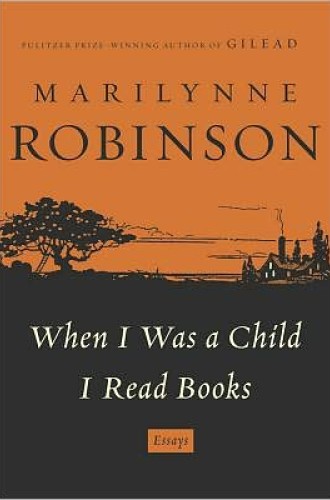When I Was a Child I Read Books, by Marilynne Robinson
To those who fear that Christian cultural engagement is in a state of intellectual poverty, I suggest looking to the work of Marilynne Robinson for reason to hope. Robinson’s nonfiction guides readers through fields as disparate as cosmology, evolutionary psychology, economics and modern biblical criticism—all the while identifying the theological thread that holds them together. Reading Robinson feels like sitting down for a conversation with one’s most widely read and psychologically insightful friend, a person whose wit is surpassed only by the lucidity of her language.
It is that same range and eloquence that makes When I Was a Child I Read Books move sporadically between being deeply insightful and irrefutably maddening, sometimes on the very same page. Much of what makes Robinson’s nonfiction a challenge to digest can be understood in terms of its profound stylistic difference from her fiction. In her Pulitzer-winning 2005 novel Gilead, her character Reverend John Ames works out a limited number of themes—grace, forgiveness, fatherhood—with a slowness that reflects the 1950s small-town Iowa that surrounds him. Conversely, Robinson’s pace is rapid in her topically broad nonfiction. As a result, the text can feel disjointed in its movements between stories and theories, and sometimes it seems as though the thesis has been left behind.
Read our latest issue or browse back issues.
Nevertheless, When I Was a Child does have a set of uniting concerns. One of these is Robinson’s distaste for our tendency to interpret the past in the shadow of our deepest prejudices. In the essay “Who Was Oberlin?” Robinson turns to the history of fundamentalism offered by Jeff Sharlet in his book The Family. By drawing from primary sources as though they are old friends, Robinson exposes Sharlet’s misreading of the reformers Charles Finney and Jonathan Edwards, demonstrating how such mistakes guide his misdiagnosis of the conservative Christian political landscape. It is a masterful essay, and one that displays Robinson’s ability to reveal the hidden and destructive logic of the stories we tell ourselves.
When I Was a Child also expands the thesis of Robinson’s 2010 book Absence of Mind by continuing to differentiate scientism as a godless ideology from science as a tool to understand God’s world in a way that healthily circumvents the typical science-religion babble. In the most recent book, she devotes a good deal of space to diagnosing the ills of the social sciences, from behaviorism (the reigning ideology of her youth), to evolutionary psychology (with its simplistic and overly confident statements about humans), to economics (in her view, an imaginatively impoverished and pragmatically destructive dismal science). Throughout the book Robinson pushes hard against the academy’s tendency to prize parsimony over mystery and notes rightly that our theories are often limited in their inability to see humans as motivated by anything deeper than calculated self-interest or the invisible hand of the “selfish gene.”
As a social scientist, I agree with Robinson that my field is limited, and I hope those who share my vocation read her work carefully. Nonetheless, I cannot help thinking that her critique is built upon a false assumption that the role of the scientist is the same as that of the novelist. Is it really fair to compare the picture of humanity found in the top social science journals to the nuances she builds into Reverend Ames in Gilead?
How would Robinson respond to Robert Kaplan’s recent Atlantic piece “Why John J. Mearsheimer Is Right (about Some Things),” in which Kaplan recounts an exchange between the late political theorist Samuel Huntington and his protégé Fareed Zakaria? Huntington preached: “If you tell people the world is complicated, you’re not doing your job as a social scientist. They already know it’s complicated. Your job is to distill it, simplify it, and give them a sense of what is the single [cause], or what are the couple of powerful causes that explain this powerful phenomenon.”
In the end, Robinson’s critique strikes me as severe. I had hoped for a more nuanced treatment of how we are to best understand the social dimension of humanity and the complementary role of science, theology and imagination in gaining that understanding.
At times, Robinson embraces an abrasively prophetic tone, especially when she turns to the economy. In the essay “The Human Spirit and the Good Society,” she denounces a capitalist system that builds a “vigorous disregard for the fragility of the planet and the finitude of its resources.” In “Austerity as Ideology,” Robinson argues that market economics “has shown itself very ready to devour what we hold dear if the list can be taken to include culture, education, the environment, and the sciences, as well as peace and the well-being of our fellow citizens.” Those are strong words, but are they accurate? In these statements, Robinson falls into the same tendency she critiques elsewhere—a selective reading of the world in the shadow of her deepest prejudices.
We all come to the table with areas in which our ideology is amplified by those who surround us, and in spite of all its benefits, higher education can also act as an echo chamber for our views. My concern is that when Robinson underplays the role of the market and democracy in generating real human benefits, she further polarizes the debate.
It is a challenge to decide, while reading this book, whether as a nonfiction writer Robinson is more prophet, poet or policy expert. Consider her concluding essay “Cosmology,” in which she expresses concern for the lack of diversity and imagination in public dialogue. Here the prophet Robinson speaks truth that we would be wise to hear. Yet in describing a solution, she starts by calling for a “vigorous and critical study of the humanities” and suggests that society’s failure is primarily “the failure of education, in the schools and also in the churches.” Why does this answer feel so shallow? Is it part of the solution? Of course! Is it sufficient to create the change she hopes for? I fear not. Often Robinson is so effective at describing the problem that her solutions appear weak.
Whatever one thinks of Robinson’s conclusions, When I Was a Child I Read Books offers a model for engagement with science, policy and the humanities by an author who takes these fields just as seriously as she does her faith. We need Robinson’s lens and perspective. Indeed, we need more thinkers like Robinson in the world, perhaps even more than we need the solutions she offers.






